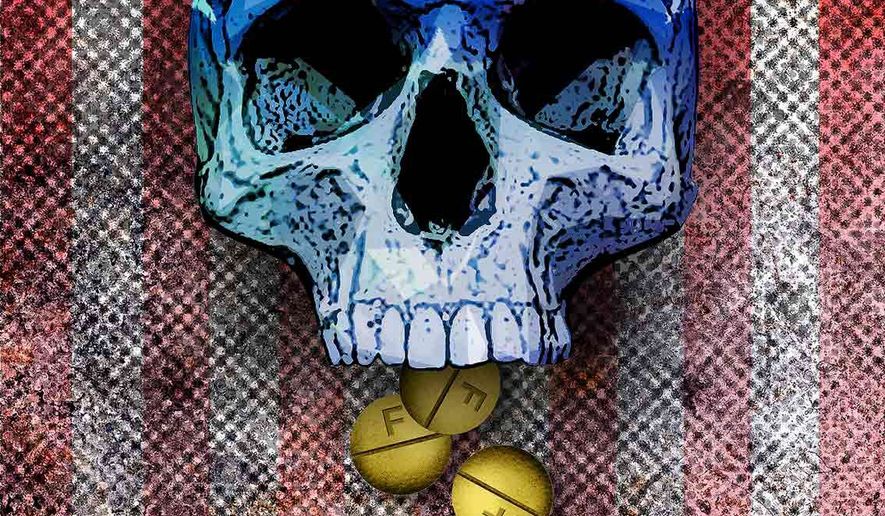OPINION:
The explosion of synthetic drugs such as fentanyl and methamphetamine is the most significant change to the drug trade in the last 20 years. Unlike plant-based drugs, such as cocaine and heroin, which require control of large swaths of territory and a favorable climate, synthetic drugs have low barriers to entry. They are relatively cheap and easy to make, easy to conceal and more potent than traditional drugs. From a trafficker’s perspective, they are the perfect drug. They are also incredibly lethal.
Illicit drugs have killed more than 1 million Americans since the turn of the century. One drug, fentanyl, is now the leading cause of death for adults between the ages of 18 and 45 — more than car accidents, violent crime and COVID-19. And the flood of synthetic drugs shows no signs of slowing.
This has significant implications for U.S. national security. The overwhelming majority of synthetic drugs enter the U.S. from Mexico, manufactured on an industrial scale with chemicals imported from China and then transported across the southwest border. Mexican cartels such as the Sinaloa Cartel and the Jalisco New Generation Cartel (CNJG) maintain a stranglehold over the drug trade in large part due to their proximity to the U.S. — the largest drug consumer in the world. According to the U.S. Drug Enforcement Administration, no other group is currently positioned to challenge them. So, what to do?
There is no silver bullet solution to such a complex problem. However, some strategies are more effective than others, especially those focused on disrupting the drug trade “upstream” before they are more difficult to stop. The urgency of today’s drug crisis requires the U.S. to consider new, bold strategies proportionate to the threat and do not rely on other countries that may not have America’s best interests at heart. This includes continued support for traditional enforcement activities and more proactive measures focused on stopping the production of synthetic drugs.
First, the U.S. must pressure China and Mexico to strictly control the precursor chemicals used to manufacture synthetic drugs. In 2019, the Chinese government outlawed the production and sale of illicit fentanyl and fentanyl analogues after an intensive U.S. diplomatic campaign, which resulted in the dramatic decrease of these substances shipped directly from China to the U.S. However, Beijing and Mexico City have been slow to control precursor chemicals, which simply shifted production from China to Mexico. The U.S. should pursue a similar diplomatic offensive to persuade China and Mexico to control precursor chemicals. Should they fail to act, the U.S. must be prepared to take additional steps to protect Americans.
For example, the U.S. and its partners must enhance efforts to interdict precursor chemicals transported from China to Mexico. The U.S. should redirect the limited number of U.S. Coast Guard and naval assets operating in the Caribbean to target the flow of precursor chemicals in the Pacific and increase law enforcement, military and intelligence efforts to detect, monitor and interdict these substances. While this is likely to face strong opposition from foreign governments and businesses concerned about supply chains, there is precedent. In 2003, the U.S. launched the Proliferation Security Initiative, a voluntary, multilateral effort to disrupt the trade in weapons of mass destruction, delivery systems and related materials. And while everyone acknowledges the dangers posed by WMD, precursor chemicals pose a much more immediate threat to the U.S. In fact, top U.S. military and Homeland Security officials have considered designating fentanyl a WMD, underscoring just how dangerous these substances really are.
Finally, the U.S. should leverage lessons learned from the wars in Iraq and Afghanistan by targeting drug chemists, who, like bomb makers, are relatively small in number and difficult to replace. U.S. counter-drug agencies should double down on efforts to identify and neutralize drug chemists, many of whom are highly trained and known to transfer their knowledge to other bad actors. Treating drug chemists as “high-value targets” would not require any new authorities, just a shift in focus, and would have a much greater impact than trying to arrest other cartel members.
The American drug crisis is unrelenting. The conveyor belt-like surge of synthetic drugs has complicated enforcement efforts and led to an increasing number of overdose deaths. To combat the drug crisis, the U.S. must improve in all areas of drug policy, including demand reduction, supply reduction and treatment. However, the spread of synthetic drugs is largely explained by supply-side factors and thus requires new, proactive counter-drug strategies to stop these drugs at the source. Ideally, other countries around the world, especially China and Mexico, would support these efforts, but if they do not, the U.S. must “strangle the baby in the cradle.”
American lives depend on it.
• Jim Crotty is the former deputy chief of staff at the U.S. Drug Enforcement Administration. He is currently an Associate Vice President at The Cohen Group, a strategic advisory firm based in Washington, DC.




Please read our comment policy before commenting.